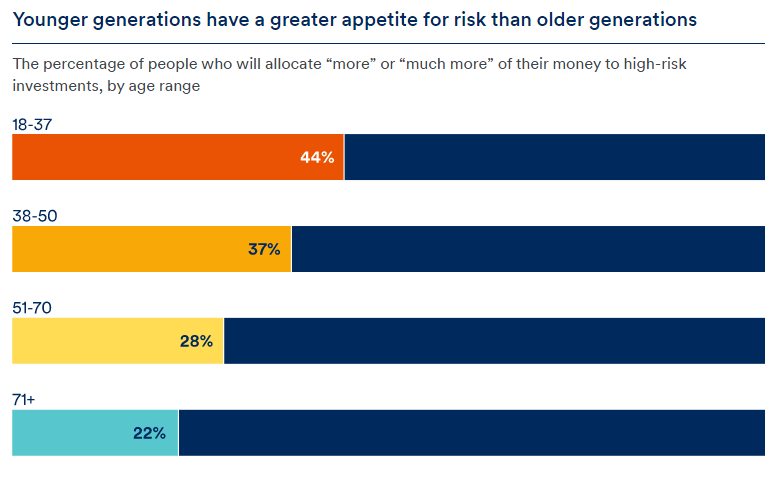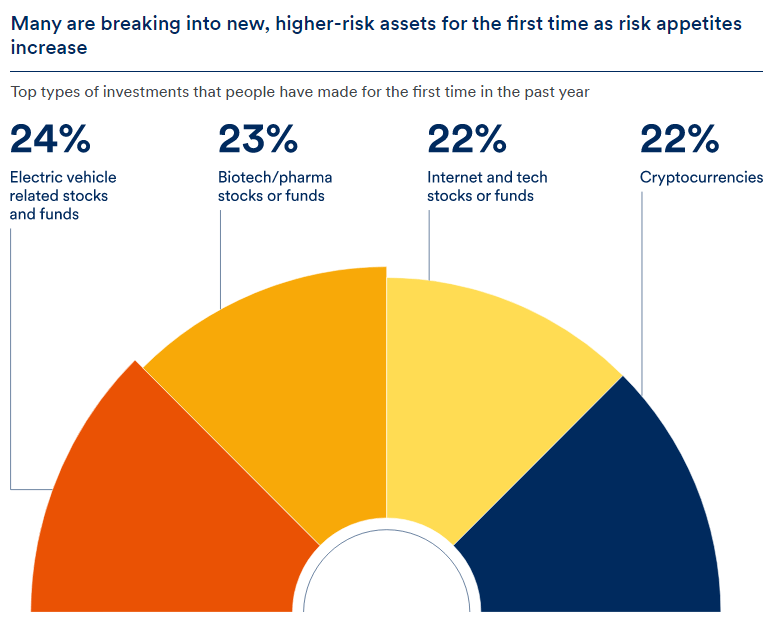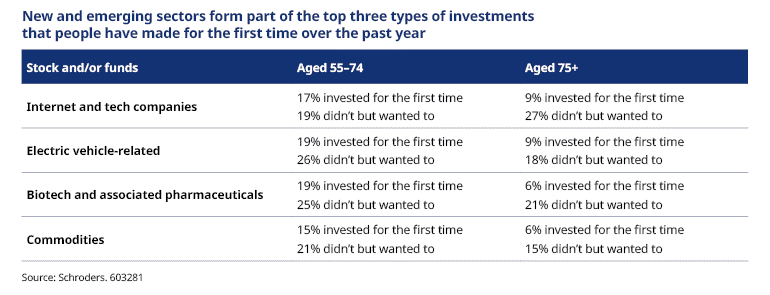Older investors embrace more investment risk…

30 December 2021
Almost half of over-55s have bought cryptocurrencies in the past two years, according to the Schroders Global Investor Study – suggesting the appetite for high-risk investments is not limited to the young.

By Victoria Beckett

Older investors as well as the young are putting their savings into a range of riskier holdings including cryptocurrencies and investments focusing on specific sectors such as healthcare and tech, research by Schroders has found.
While young investors’ interest in bitcoin and other crypto is well documented, Schroders’ data uncovers a surprising level of interest among older savers – including those aged over 75.
One third (33%) of those aged between 55 and 74 – said they bought crypto in the 12 months up to spring 2021. This was a first-time investment for 16% of respondents in that age group, while 17% said they were adding to existing holdings. A smaller but still significant 15% of over-75s had also invested in crypto in the same period.
These findings are part of the Schroders Global Investor Study 2021, the bellwether annual survey which highlights trends based on the answers and opinions of more than 23,000 investors in 33 locations. Data was gathered between March and August 2021.
While Schroders’ findings confirm that investors aged between 18-41 are the most committed to cryptocurrencies (see table, below), the difference between younger and older age groups is narrower than might be expected. For example, 24% of those aged 18-22 invested in crypto for the first time in the past year, compared to a similar 22% of the 42-54 age group.

All generations are taking on more risk
More than a third of people of all age groups said they will or had allocated more towards high-risk investments following the lifting of lockdowns. Unsurprisingly, perhaps, younger investors seem to have the greatest appetite for risk with 44% of 18-37 years old saying that they will allocate more to riskier investments.
But 28% of 51-70 years olds, and 22% of people aged 71 or over older, also said they were taking on more risk.

Emerging sectors are increasingly popular
Alongside cryptocurrencies, new technologies are also in demand as savers move toward higher-risk or newer assets (see chart below). Across investors of all ages, electric vehicle-related stocks and funds are ranked most popular (24%), with biotech or pharma second (23%). Internet and tech stocks, along with cryptocurrencies, are jointly in third position.

Again, when viewed by age group, older savers are also keen on these assets. Almost half (45%) of those aged between 55-74 either invested in electric vehicle funds or stocks for the first time, or said they wanted to invest. A further 27% of respondents aged 75 or above gave the same response.

“Our research indicates that many people feel they now have to take on more risk in pursuit of returns following the pandemic,” says Lesley-Ann Morgan, Head of Multi-Asset Strategy at Schroders.
Economic disruption in the wake of the pandemic has played a part in driving this trend, she suggests. “Amid the low interest rate environment, riskier investment choices have unsurprisingly become more compelling.”
In recent years the value of many investments and holdings – including some widely-held cryptocurrencies – has risen strongly. This trend may not last.
“Overall these findings demonstrate that the proportion of investors open to embracing greater risk has increased, but with 63% of people stating that the performance of their investments also has an impact on their mental health, they should ensure that risk is approached judiciously,” she warns.
Important information
This communication is marketing material. The views and opinions contained herein are those of the named author(s) on this page, and may not necessarily represent views expressed or reflected in other Schroders communications, strategies or funds.
This document is intended to be for information purposes only and it is not intended as promotional material in any respect. The material is not intended as an offer or solicitation for the purchase or sale of any financial instrument. The material is not intended to provide, and should not be relied on for, accounting, legal or tax advice, or investment recommendations. Information herein is believed to be reliable but Schroder Investment Management Ltd (Schroders) does not warrant its completeness or accuracy.
The data has been sourced by Schroders and should be independently verified before further publication or use. No responsibility can be accepted for error of fact or opinion. This does not exclude or restrict any duty or liability that Schroders has to its customers under the Financial Services and Markets Act 2000 (as amended from time to time) or any other regulatory system. Reliance should not be placed on the views and information in the document when taking individual investment and/or strategic decisions.
Past Performance is not a guide to future performance. The value of investments and the income from them may go down as well as up and investors may not get back the amounts originally invested. Exchange rate changes may cause the value of any overseas investments to rise or fall.
Any sectors, securities, regions or countries shown above are for illustrative purposes only and are not to be considered a recommendation to buy or sell.
The forecasts included should not be relied upon, are not guaranteed and are provided only as at the date of issue. Our forecasts are based on our own assumptions which may change. Forecasts and assumptions may be affected by external economic or other factors.
Issued by Schroder Unit Trusts Limited, 1 London Wall Place, London EC2Y 5AU. Registered Number 4191730 England. Authorised and regulated by the Financial Conduct Authority.
For investors that would like to get more information on the wide range of Sustainable and Ethical type investment opportunities, please click the more information button at the bottom of this page.
Sustainable Investing – Ethical Business Standards
